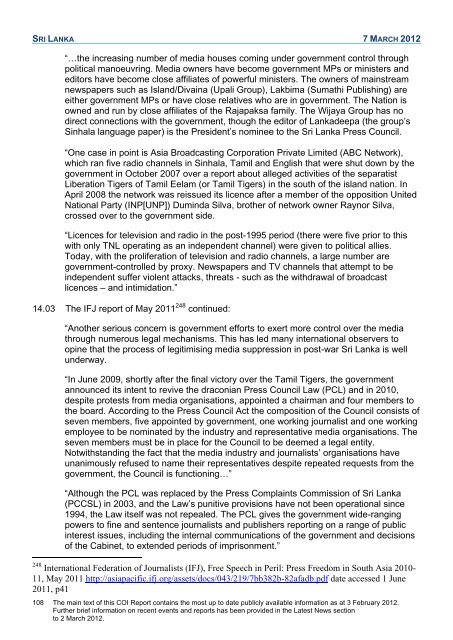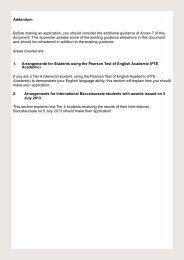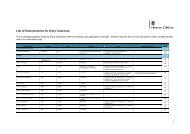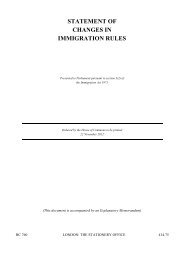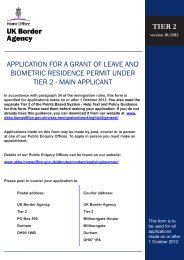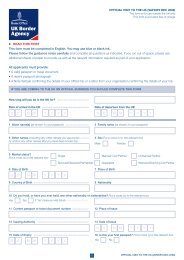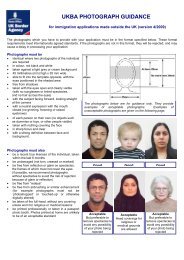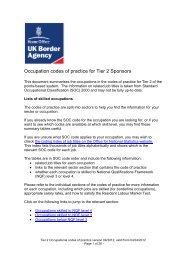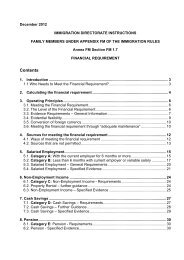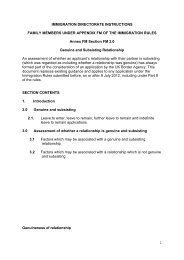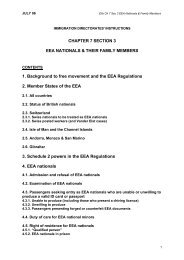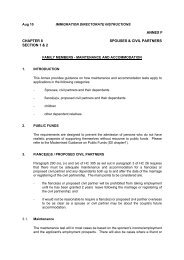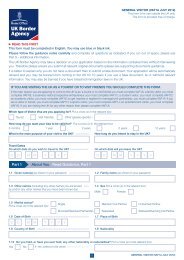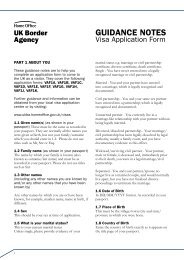COI Report March 2012 - UK Border Agency - Home Office
COI Report March 2012 - UK Border Agency - Home Office
COI Report March 2012 - UK Border Agency - Home Office
Create successful ePaper yourself
Turn your PDF publications into a flip-book with our unique Google optimized e-Paper software.
SRI LANKA 7 MARCH <strong>2012</strong><br />
―…the increasing number of media houses coming under government control through<br />
political manoeuvring. Media owners have become government MPs or ministers and<br />
editors have become close affiliates of powerful ministers. The owners of mainstream<br />
newspapers such as Island/Divaina (Upali Group), Lakbima (Sumathi Publishing) are<br />
either government MPs or have close relatives who are in government. The Nation is<br />
owned and run by close affiliates of the Rajapaksa family. The Wijaya Group has no<br />
direct connections with the government, though the editor of Lankadeepa (the group‘s<br />
Sinhala language paper) is the President‘s nominee to the Sri Lanka Press Council.<br />
―One case in point is Asia Broadcasting Corporation Private Limited (ABC Network),<br />
which ran five radio channels in Sinhala, Tamil and English that were shut down by the<br />
government in October 2007 over a report about alleged activities of the separatist<br />
Liberation Tigers of Tamil Eelam (or Tamil Tigers) in the south of the island nation. In<br />
April 2008 the network was reissued its licence after a member of the opposition United<br />
National Party (INP[UNP]) Duminda Silva, brother of network owner Raynor Silva,<br />
crossed over to the government side.<br />
―Licences for television and radio in the post-1995 period (there were five prior to this<br />
with only TNL operating as an independent channel) were given to political allies.<br />
Today, with the proliferation of television and radio channels, a large number are<br />
government-controlled by proxy. Newspapers and TV channels that attempt to be<br />
independent suffer violent attacks, threats - such as the withdrawal of broadcast<br />
licences – and intimidation.‖<br />
14.03 The IFJ report of May 2011 248 continued:<br />
―Another serious concern is government efforts to exert more control over the media<br />
through numerous legal mechanisms. This has led many international observers to<br />
opine that the process of legitimising media suppression in post-war Sri Lanka is well<br />
underway.<br />
―In June 2009, shortly after the final victory over the Tamil Tigers, the government<br />
announced its intent to revive the draconian Press Council Law (PCL) and in 2010,<br />
despite protests from media organisations, appointed a chairman and four members to<br />
the board. According to the Press Council Act the composition of the Council consists of<br />
seven members, five appointed by government, one working journalist and one working<br />
employee to be nominated by the industry and representative media organisations. The<br />
seven members must be in place for the Council to be deemed a legal entity.<br />
Notwithstanding the fact that the media industry and journalists‘ organisations have<br />
unanimously refused to name their representatives despite repeated requests from the<br />
government, the Council is functioning…‖<br />
―Although the PCL was replaced by the Press Complaints Commission of Sri Lanka<br />
(PCCSL) in 2003, and the Law‘s punitive provisions have not been operational since<br />
1994, the Law itself was not repealed. The PCL gives the government wide-ranging<br />
powers to fine and sentence journalists and publishers reporting on a range of public<br />
interest issues, including the internal communications of the government and decisions<br />
of the Cabinet, to extended periods of imprisonment.‖<br />
248 International Federation of Journalists (IFJ), Free Speech in Peril: Press Freedom in South Asia 2010-<br />
11, May 2011 http://asiapacific.ifj.org/assets/docs/043/219/7bb382b-82afadb.pdf date accessed 1 June<br />
2011, p41<br />
108 The main text of this <strong>COI</strong> <strong>Report</strong> contains the most up to date publicly available information as at 3 February <strong>2012</strong>.<br />
Further brief information on recent events and reports has been provided in the Latest News section<br />
to 2 <strong>March</strong> <strong>2012</strong>.


